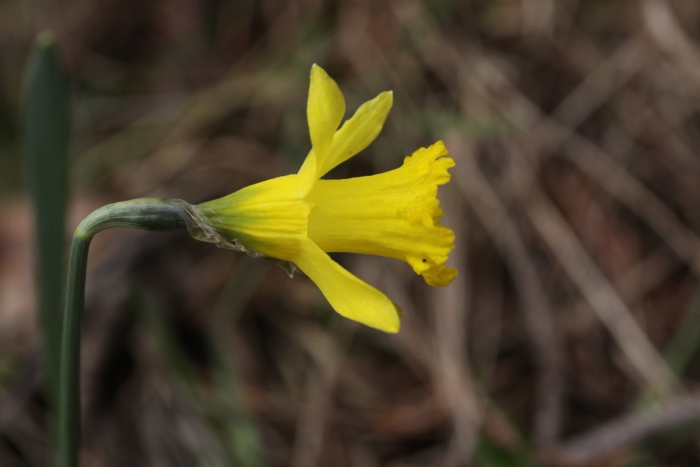Lesser Daffodil
(Narcissus minor)
Lesser Daffodil (Narcissus minor)
/
/

Mark Gurney
CC BY 4.0
Image By:
Mark Gurney
Recorded By:
Copyright:
CC BY 4.0
Copyright Notice:
Photo by: Mark Gurney | License Type: CC BY 4.0 | License URL: http://creativecommons.org/licenses/by/4.0/ | Rights Holder: Mark Gurney | Publisher: iNaturalist | Date Created: 2016-04-11T12:16:05-07:00 |

























Estimated Native Range
Summary
Narcissus minor, commonly known as the lesser daffodil, is a perennial herbaceous bulb native to the high-altitude meadows and rocky areas of the Pyrenees mountain range in northern Spain and southern France. It is a diminutive species, typically reaching 3-10 inches in height, and produces solitary, trumpet-shaped, bright yellow flowers in early spring. The lesser daffodil is particularly noted for its early flowering period and is one of the first daffodils to bloom, often emerging as the snow melts.
The lesser daffodil is valued for its hardiness and ability to naturalize, forming attractive clumps over time. It is ideal for rock gardens, borders, and underplanting beneath deciduous trees. The cultivar ’Little Gem’ has been recognized with the Royal Horticultural Society’s Award of Garden Merit, indicating its excellence for garden use. This species prefers well-drained soil, moderate moisture, and full to partial sun exposure. While generally low-maintenance, it can be susceptible to bulb rot if planted in poorly drained soils. It is also resistant to deer and rabbit browsing, making it a good choice for areas with wildlife pressure. In some regions, Narcissus minor has naturalized beyond its cultivated settings, which can be a concern if it outcompetes native flora.CC BY-SA 4.0
The lesser daffodil is valued for its hardiness and ability to naturalize, forming attractive clumps over time. It is ideal for rock gardens, borders, and underplanting beneath deciduous trees. The cultivar ’Little Gem’ has been recognized with the Royal Horticultural Society’s Award of Garden Merit, indicating its excellence for garden use. This species prefers well-drained soil, moderate moisture, and full to partial sun exposure. While generally low-maintenance, it can be susceptible to bulb rot if planted in poorly drained soils. It is also resistant to deer and rabbit browsing, making it a good choice for areas with wildlife pressure. In some regions, Narcissus minor has naturalized beyond its cultivated settings, which can be a concern if it outcompetes native flora.CC BY-SA 4.0
Plant Description
- Plant Type: Herb, Bulb
- Height: 0.5-1 feet
- Width: 0.5-1 feet
- Growth Rate: Moderate
- Flower Color: Yellow
- Flowering Season: Spring
- Leaf Retention: Deciduous
Growth Requirements
- Sun: Full Sun, Part Shade
- Water: Medium
- Drainage: Medium, Fast
Common Uses
Bee Garden, Border Plant, Low Maintenance, Potted Plant, Rock Garden, Street Planting
Natural Habitat
Native to high-altitude meadows and rocky areas of the Pyrenees mountains
Other Names
Common Names: Dwarf Daffodil, Small Daffodil
Scientific Names: , Narcissus minor, Ajax minimus, Ajax minor, Ajax minor, Ajax minor var. altior, Ajax minor var. angustus, Ajax minor var. conspicuus, Ajax minor var. erectior, Ajax minor var. humilior
GBIF Accepted Name: